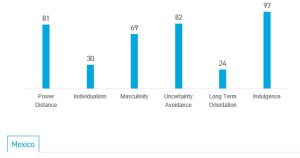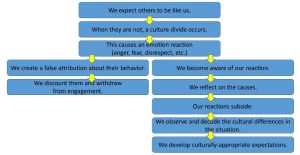2
What Is Culture?
Culture is a system of values and norms shared among a group of people that directs and justifies how members operate, live, and behave. Culture has many layers and ways in which it manifests itself within a group, business, geographical location, etc. The core basis is still the same if we share a system of norms and values within a group; no matter how large or small we are part of a culture. In a sense, business could be considered a culture, the shared value being to generate profits through investment, improved efficiencies and capitalizing on opportunity cost. The shared norm and value is centered on finding the specific opportunity cost for your business and making the most out of that opportunity. Some companies may find the most significant opportunity in finding ways to create jobs thus elevating the financial status of the society in which they operate. Others may find it through improved efficiencies, using innovation to get more done in a shorter time with less waste. In the non-profit world, the culture is to maximize the positive impact of their initiative.
Culture and Religion
Religion is tied to culture, followed by having different faiths and beliefs. This connection means that the impact of religious beliefs has a definite effect on international business and culture. After all, religious beliefs are a guide for which people gauge the morality of their actions in all aspects of their lives. Moreover, while it’s clear that ethics are not religion, values based on religious teachings have influenced our understanding of ethical behavior.
Principles a society believes to be good, right, and desirable
In the United States of America, culture holds individual respect and ethical treatment of others without regard to physical characteristics. So much so that we have laws in place to protect minorities of protected classes. Title VII of the Civil Rights Act defines these protected classes as Pregnancy, Age, Ethnicity, National Origin, Sex, Religion, and Race. We also value personal freedom and the belief that all Americans have equal opportunity to achieve success. Different countries have different customs related to their culture; for example, in European countries, it is appropriate to greet others with a kiss on each cheek. Conversely, in the United States of America, this would not be considered appropriate. While it is not a written rule or law, it is most certainly a social rule for each culture.
Hofstede’s Framework
Hofstede’s cultural dimensions is a framework intended to aid in cross-cultural communication. Geert Hofstede developed the framework to describe the effects of culture on a societies values, and how these values impact the behaviors of its members.
Power Distance: Power Distance is the level in which less powerful members of a culture accept and expect power to be distributed unequally.
Individualism vs. Collectivism: Individualism defined is that people are expected to care for themselves and their families with little interaction or help from society. Collectivism cultures focus more on society being close-knit, expecting that relatives or a specific group will look after them in exchange for loyalty.
Masculinity vs. Femininity: A masculine-dominated culture focuses on societal achievement, heroism, assertiveness, and material rewards for success. Whereas, femininity more rooted in cooperation, modesty, caring for others and improving quality of life.
Uncertainty Avoidance: The degree of comfort a society has with uncertainty and ambiguity.
Long-Term vs. Short-Term Orientation: A low score in long-term orientation comes from a culture with strong ties to the past and maintenance of long-standing traditions and cultural norms. A high score would be given to a culture that is more pragmatic, accepting modern education and thrift.
Indulgence vs. Restraint: Indulgence is a society that allows free gratification of basic and natural human drives toward enjoying life and having fun. Restraint maintains strict social norms based on suppressing gratification.
Comparisons using Hofstede’s Framework of cultures



Culture and what comprises culture:
There are 5.8 billion people globally that identify with a religious group; they represent 84% of the 2010 worldwide population. (Harper, 2012) This large percentage means the impact of religious beliefs has a definite impact on international business and culture. Religious beliefs are a guide for which people gauge the morality of their actions in all aspects of their lives. It is safe to say that differences in religious beliefs are impacting our economy and business dealings just as they have for millennia.
Ethics do not equal religion. Values based on religious teachings influence our understanding of ethical behavior. Western thought and philosophies over the past few centuries have impacted global business. Global business has been heavily impacted by the mode of thinking that began with the Reformation and post-Enlightenment values, which placed focus on equality and individual rights.
Political Philosophy: The term political philosophy doesn’t have a specific definition so we must examine each word individually. Political or politics are based on assumptions or principles rooted in what is perceived to be the commonly accepted governance over a city, state or country. Philosophy is the study of a theory of specific knowledge or thought process.
In some places, democracy is the prevailing form of politics, where the votes of the people steer the direction of political policies. Other cultures fall under monarchies and or dictatorships. A monarchy is a type of political philosophy where the governance of a people is represented by a family of power. Most modern monarchies do have a democratic political process in place, where the voice of the people is taken into consideration, some use voting to determine the will of the people. A dictatorship, on the other hand, is a political entity in which an individual or group of individuals think they know what is best for their society, then, in turn, create a philosophy based in their beliefs.
Economic Philosophy: Economics is defined as the science that deals with the production, distribution, and consumption of commodities. (Dictionary.com, n.d.) Philosophy is a study or particular way of thinking. Across cultures, economic philosophy differs significantly, in China, for example, they follow a Marxist philosophy. BEIJING, Nov. 24 (Xinhua) — Chinese President Xi Jinping has called for new advances in Marxist economic philosophy by turning practices and experiences in China’s economic development into economic theories. Xi Jinping stated the need to uphold and improve the basic socialist economic system. He stressed that people should consolidate and develop the public sector while encouraging, supporting the non-public sector to develop. “The mainstay status of the public ownership and the leading role of the state-owned economy must not waver,” he said, adding that these could ensure that people from all ethnic groups share the fruit of development, and they are guarantees for solidifying CPC’s ruling status and adherence to the socialist system. (Huaxia, 2015)
India follows a different economic philosophy, developing into a more open-market economy. They do still hold on to the cast system where social mobility is limited based on birth.

Communication (verbal and non-verbal): The way in which we communicate verbally and non-verbally also varies considerably by culture. Effective communication is essential for a successful business encounter.
In Arab culture, for example, it is an insult to show the bottom of your shoe to another. This behavior would be a form of non-verbal communication. Used to great effect by Muntadhar al-Zaidi when he threw his shoe at President George W. Bush during a speech. The video went viral due impart to its comedic effect in the United States, which points out the cultural difference between the two societies. Make no mistake the shoe throwing incident was intended as an insult.
Verbal communication and not understanding the culture in which you’re communicating can have implications as well. As an example, the qualities appreciated by Spaniard’s are character and modesty. They do not emphasize professional experience or business success, as do other Western European countries. It is essential to be patient, listen and pay attention and display some personal pride and honor, to prove yourself and gain the respect of your associates. Another valued characteristic is the ability to be amusing and entertaining, as humor plays an important role, even in business encounters. Sarcasm might offend your Spanish counterparts or undermine their respect and trust; although, it is difficult to cause real offense without being directly insulting. You should avoid making disrespectful remarks about Spanish traditions or practices and, under no circumstances, should you comment on national or regional stereotypes that Spaniards may find insulting. (businessculture.org, n.d.)
Culture and values, norms, folkways, and mores:
- Principles a society believes to be good, right, and desirable.
American culture holds individual respect and ethical treatment of others without regard to physical characteristics in high regard. So much so that we have laws in place to protect minorities of protected classes. Title VII of the Civil Rights Act defines these protected classes as Pregnancy, Age, Ethnicity, National Origin, Sex, Religion, and Race. We also value personal freedom and the belief that all Americans have equal opportunity to achieve success. These principles are a stark contrast to the cast system of India.
- Social rules and guidelines that prescribe appropriate behaviors.
Appropriate behavior is another aspect of culture that we need to be aware of. In some European countries, it is appropriate to greet others with a kiss on each cheek. Conversely, in America, this would not be considered appropriate. While it is not a written rule or law is most certainly is a social rule for each culture. Another example would be in America it is appropriate for men to hold the door open for women and allow them to pass through first. In Arab countries, it is considered rude for a man to allow or suggest a woman go first. The reason being it places the man in a position to ogle her from behind, which would offend her modesty. (Parker, n.d.)
- Sub-set of Norms: Routine conventions of everyday life.
Early American sociologist William Graham Sumner is credited to be the first to write about folkways. (See Folkways: A Study of the Sociological Importance of Usages, Manners, Customs, Mores, and Morals (1906).) Sumner created the framework for how sociologists understand this term today. Folkways are norms that stem from and organize casual interaction; They emerge out of repetition and routines. We engage in them to satisfy our daily needs. They are most often unconscious in operation, though quite useful to the ordered functioning of society. For example, the practice of waiting in line in many societies is an example of a folkway. (Understanding Folkways, n.d.)
- Sub-set of Norms: Seen as central to the functioning of society.
Mores are more strict than folkways. They determine what is considered the moral and ethical behavior in a society. Mores structure the difference between right and wrong. People feel strongly about mores. Violating mores typically results in disapproval or ostracizing. As such, mores exact a more coercive force in shaping our values, beliefs, behavior, and interactions than do folkways.
Religious doctrines are an example of mores that govern social behavior. For example, many religions have prohibitions on cohabitating with a romantic partner before marriage. (Understanding Folkways, n.d.)
Culture and high vs. low context:
In high context culture, it is more important to “paint the picture” than to get straight to the point.
High context cultures:
- Value traditions.
- Foster long-lasting relationships.
- Rely on non-verbal signs such as tone of voice, facial expressions, body language, and so on.
- Tend to be non-confrontational and more in-direct. Rejection is to be interpreted from non-explicit communication.
- Require little explanation.
- Are more collectivistic. The identity lies with the group.
- Value group harmony.
- Have stronger boundaries, i.e., one belongs to a certain group.
- Are slow to change.
Low context cultures:
- Tend to make many shallower, short-term relationships.
- Require explicit communication since they lack additional context.
- Communication is more direct and confrontational.
- Are more individualistic. Identify lies with the individual.
- Value individual needs.
- Require all the information in the message.
- Can change quickly. (Frost, 2013)
Culture in the workplace:
Ethnocentric: Someone who believes that his or her ethnic group or culture is superior to those of others.
Ethnocentric Approach: A company that fills all key management positions with parent-company nationals.
Pros:
- Fill skills gaps in the host country.
- Can help transfer core competencies to the host country.
- Helps maintain a unified corporate culture.
Cons:
- Produces resentment in the host country.
- Can lead to cultural myopia.
It is important for businesses to find the proper balance between an ethnocentric approach and adapting to the culture of the market they are serving. In the example of Duncan Doughnuts and Baskin Robins adapting flavors that take into consideration, local tastes were the difference between success and failure. The same is true for Jollibee vs. McDonald’s in Manila. The ethnocentric approach McDonald’s took by keeping their standard menu failed, in comparison, Jollibee adjusted for the local tastes and thrived.
Culture Shock
Culture shock is defined as confusion and uncertainty experienced by someone suddenly subjected to an unfamiliar culture, a way of life, or set of attitudes. One example would be when we fostered a boy from Mexico. Upon his 18th birthday, he was a man based on his culture. However, in our culture age does not determine adulthood as much as experience and ability to be self-sufficient. This scenario created a culture shock on both sides; he didn’t understand the need to respect the rules of our home or the foster care system. Feeling he should be able to come and go as he pleased with no communication. We, on the other hand, expected rules such as curfew being home on time, and open communication of what, where, and with whom would be observed. When we expect others to act in a way that aligns with our culture and ideals, but that goes against their culture and ideals we have opened the door to culture shock.
Steps to Mitigate its Effects
Though we may not think so consciously, we expect others to be like us; not exactly, of course, but generally speaking we expect others to conform to basic cultural expectations. When this doesn’t happen–when someone doesn’t conform with what we feel is a basic cultural truth–then a cultural divide occurs. When this happens, it’s natural that we should respond emotionally. Maybe we become confused or a little unsettled. We may feel disrespect for the person. We can even become angry and violent. Feeling these things is natural and doesn’t make us a bad person; how we respond may. We can choose one of two directions: we can create false attributions to their behavior, speculating that they do what the do because they’re “dirty,” “uncivilized,” “backward,” or “stupid,” then disengage, or we can take another, more positive path. In this path, we first become aware of our feelings and reflect on what may have caused them. This approach allows the more vitriolic emotions to subside and make room for lucid considerations. We then seek to learn the roots of the foreign cultural behavior, so we can better understand why this group does what it does. We can then develop culturally-appropriate expectations around the behaviors, so it no longer throws us off our game.

Examples Here in Utah
Society always has been and will continue to be ever evolving, a living thing if you will. We are continually changing as a result of the cultural impacts of its members. Whether through a permanent relocation or a temporary move, whenever we enter into a new society, we bring our culture with us.
Our first example is REAL Salt Lake City, major league Soccer team. In July 2004 Salt Lake City was awarded an expansion team for the 10th Major League Soccer season. In October of 2004, the defunct CD Chivas USA team was renamed REAL Salt Lake and thus became the 12th MLS franchise. (Lake, n.d.) The Chivas USA was a subsidiary of Mexican Soccer club C.D. Guadalajara. (Wikipedia, n.d.) There is no doubt that the steady increase in Latin Americans and their culture brought professional soccer to Utah. In 2012 REAL was valued at $85 Million and brought in $23 million in revenue, coming in 14th on Forbes list of most valuable MLS teams. (Forbes, n.d.)
Next, is the quinceanera shops in the Salt Lake City Area. In Latin American culture the quinceanera is a celebration of a girl’s 15th birthday marking the transition from childhood to adulthood. (Google, n.d.) Savvy Latin business owners in Salt Lake have capitalized on this tradition and also sell formal dresses for other occasions such as formal dances and weddings.
Lastly, the impact Utah Culture has had on a global scale. The Church of Jesus Christ of Latter-day Saints (LDS) missionary program has 70,946 people in 422 missions. The LDS also provides humanitarian relief in 189 countries, with 10,238 missionaries delivering services. Each of the 81,184 LDS missionaries is sharing their culture with the communities they are living in locally.
References
Business communication in Spain: Language matters and … (n.d.). Retrieved from http://businessculture.org/southern-europe/business-culture-in-spain/business-communication-in-spain/
Chivas USA. (2018, April 13). Retrieved from https://en.wikipedia.org/wiki/Chivas_USA
Crossman, A. (n.d.). What Are the Differences Between Folkways, Mores, Taboos, and Laws? Retrieved from https://www.thoughtco.com/folkways-mores-taboos-and-laws-3026267
Economics. (n.d.). Retrieved from http://www.dictionary.com/browse/economics
Frost, A. (n.d.). High Context and Low Context Cultures. Retrieved from http://restaurantkyoto.dk/blog/en/high-context-and-low-context-cultures/
Harper, J. (2012, December 23). 84 percent of the world population has faith; a third are Christian. Retrieved from https://www.washingtontimes.com/blog/watercooler/2012/dec/23/84-percent-world-population-has-faith-third-are-ch/
MSTRSL Communications. (2018, February 28). A Historical Perspective of Real Salt Lake. Retrieved from https://www.rsl.com/post/2018/02/28/historical-perspective-real-salt-lake
National Culture. (n.d.). Retrieved from https://www.hofstede-insights.com/models/national-culture/
Parker, N. (2014, December 14). Appreciating Arab Etiquette And Attitudes:. Retrieved from http://www.asfar.org.uk/appreciating-arab-etiquette-and-attitudes/
Religion. (n.d.). Retrieved from https://www.merriam-webster.com/dictionary/religion
Xi stresses development of Marxist economic philosophy. (2015, November 24). Retrieved from http://www.xinhuanet.com/english/2015-11/24/c_134850754.htm

